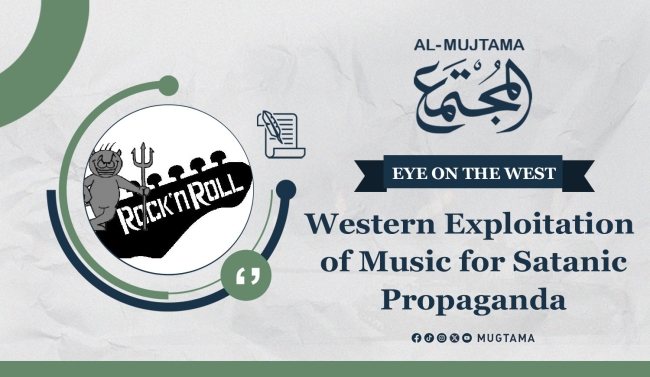Western Exploitation of Music for Satanic Propaganda
"I sold my soul to the devil"—this phrase has been repeated by numerous singers and actors, becoming so normalized in the West that people barely pay it any attention. But what does it really mean? Why do they say it? Have these artists truly become devil worshippers?
What raises both surprise and concern in the Western artistic scene is the clear shift in the messages being conveyed. Art is no longer limited to being a medium of entertainment or creativity; it has transcended that to become a tool for disseminating messages with explicit satanic and sexual undertones. This is evident in the statements of artists and singers, with some openly referring to Satan as a "lord" or thanking him publicly during events like winning prestigious awards.
Satanic symbols have become prominently featured in music album designs, including pentagrams, goat heads, triangular eyes, and inverted crosses. These are not mere decorative elements but carry connotations linked to known satanic cultures and rituals. This prevalence of symbols goes beyond album designs to include the clothing worn by artists in music videos and events, even entering the lyrics of songs often laden with satanic and sexual innuendos. It doesn't stop at symbols; some go as far as performing satanic rituals, donning horns on their heads, and using these symbols in their performances, executing movements and arrangements resembling secret societies' ceremonies, such as ritualistic dances or attire hinting at ceremonial themes.
These satanic rituals in the artistic world spark widespread debate between believers and skeptics. However, this controversy reflects a broader picture of modern media's reality and its current state. Despite some artists who left the industry admitting the existence of unethical practices behind the scenes, not to mention what occurs publicly, the media continues to downplay these claims, portraying them as mere conspiracy theories without any basis in reality.
The media employs the concept of "freedom of expression" to justify everything contrary to nature and morals, as if freedom implies liberation from all constraints and responsibilities. In this context, anything controversial, no matter how vulgar or shocking, has become a means to grab attention. Thus, music today is exploited to promote ideas and actions that conflict with human and ethical principles, with the primary goal being profit and higher viewership ratings, regardless of the means or consequences.
Yet, media justifications have not prevented the questions arising from these practices: What is the purpose of their repetition? Is it merely a display of audacity and nonconformity to attract attention and increase profits, or are there deeper dimensions that this industry seeks to embed in public consciousness, particularly among the youth?
Undoubtedly, music significantly impacts the psyche, influencing a person's emotions, thoughts, and overall well-being. Music can be as addictive as drugs and alcohol, affecting mental, spiritual, emotional, physical, religious, and intellectual health. Thus, it serves as an ideal medium to spread ideas that transcend religious and moral boundaries to the largest possible audience, especially since the primary target demographic consists of youth and teenagers. These hidden messages become deeply ingrained in their minds unconsciously, leading to widespread intellectual and moral deviations.
Music in Islam
Islam encourages awareness of what is presented to an individual and urges contemplation before imitating what is observed. Allah says: "O you who have believed, protect yourselves and your families from a Fire" (At-Tahrim: 6). Reflecting with a sound heart and mind is crucial. Therefore, Islam has prohibited music and singing. Ibn Mas’ud (may Allah be pleased with him) said: "Singing produces hypocrisy in the heart just as water makes plants grow." Scholars explain that singing distracts the heart from the remembrance of Allah and makes the Qur’an burdensome on the soul, as the "Qur'an of Ar-Rahman" and the "Qur'an of the devil" cannot coexist in one heart. Singing stirs desires and leads away from acts of obedience, preparing the heart for heedlessness and hypocrisy.
Scholars have also described music as the "incantation of fornication" due to its direct influence in arousing desires and diminishing modesty. Yazid ibn al-Walid said: "O Banu Umayyah! Avoid music, for it reduces modesty, increases desires, and undermines virtue. It serves as a substitute for intoxicants and does what drunkenness does. If you must do it, keep it away from women, for music invites to fornication."
Evidence for the prohibition of music includes the verse: "And of the people is he who buys the amusement of speech to mislead [others] from the way of Allah without knowledge and takes it in ridicule. Those will have a humiliating punishment." (Luqman: 6). Ibn Mas’ud said regarding this verse: "By Allah, it refers to singing." He intended singing accompanied by musical instruments.
Anyone who contemplates the state of those preoccupied with listening to music and instruments or involved in its performance and production will notice the futility and immorality in their gatherings, their heedlessness in performing acts of worship, and their aversion to understanding and benefiting from the Qur'an. This makes the wisdom behind the prohibition of such music evident. Moreover, a Muslim is required to adhere to Allah's rulings even without fully comprehending their wisdom. How much clearer, then, when the wisdom is apparent to anyone who reflects and is free from whims! Allah knows best.
-------------------------------------------------------------
Sources:
- "The Ruling on Singing, Musical Instruments, Amusement Tools, and Sound Effects" Book by Abu Faisal Al-Badrani
- Satan really is red hot in the entertainment world right now, The Times Leader
- The Grammys: A Satanic Snooze-fest, Cashmere Valley Record
- “Deception: A Look into Satan’s Influence on the Music and Entertainment Industry” book by Edward R. Johnson


